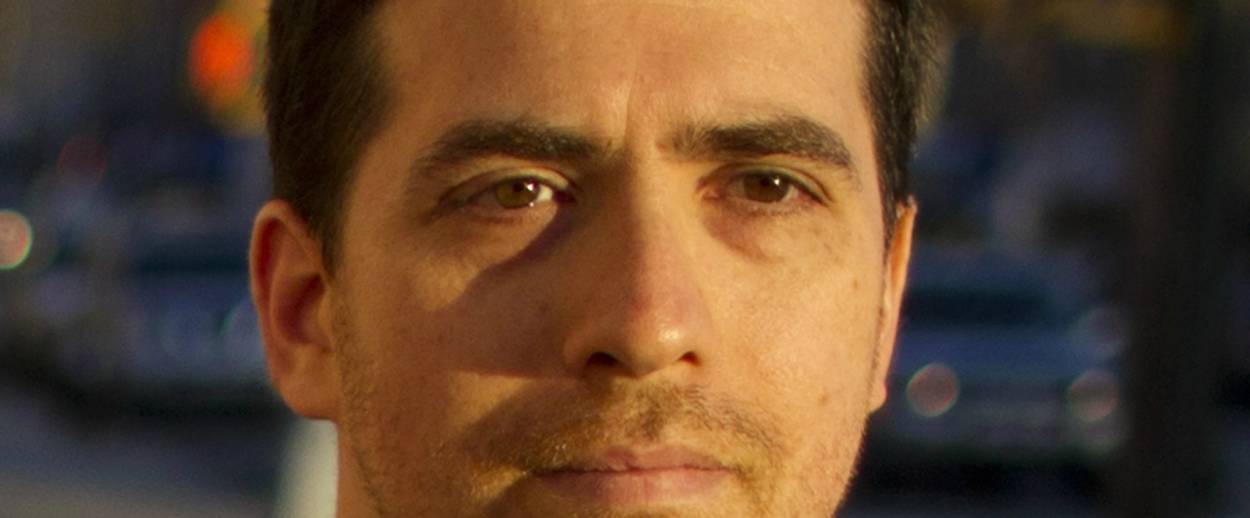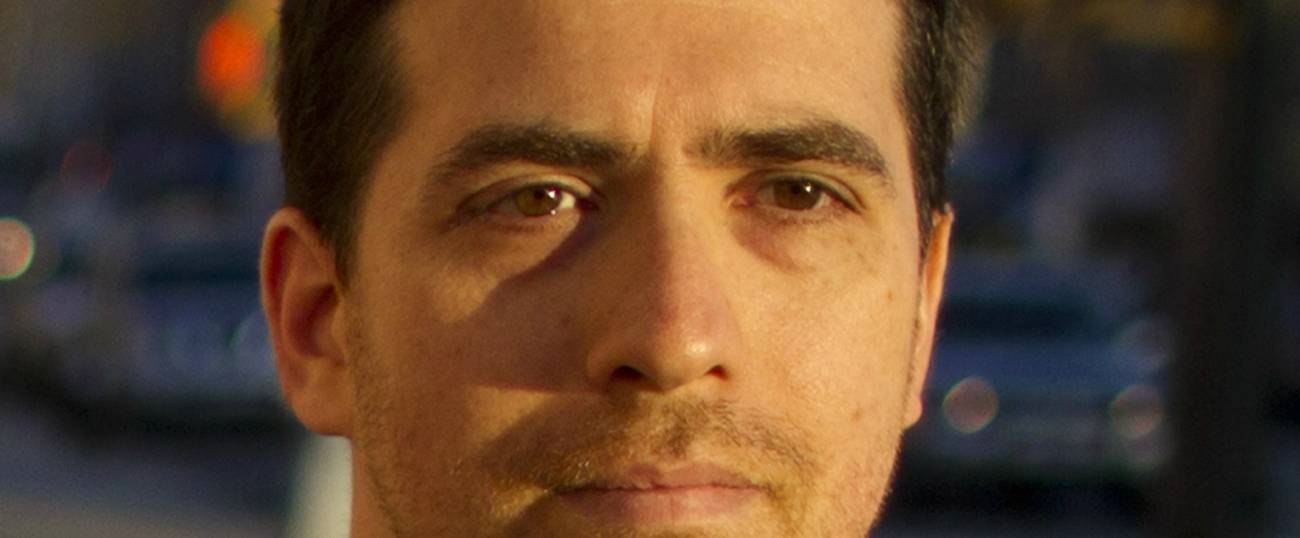In Conversation with Author Shulem Deen
A wide-ranging interview covers his Hasidic father’s secret room full of books about other religions, why Judaism needs community, faith, happiness, and other vital matters




Shulem Deen, 44, is a former Skverer Hasid and author of the memoir All Who Go Do Not Return. He coaches memoir writing and regularly contributes to The Forward. More than a decade after being expelled from his community, and three years after publishing his memoir, the well-spoken Deen sits down to talk with Tablet about everything from science to the future of Judaism.
This interview has been edited and condensed for clarity.
Have you found anything outside of Orthodoxy that provides the same unfiltered joy you once experienced?
I’ve looked within Judaism, outside of Orthodoxy and I’ve looked seriously. I found my way to acceptance of the fact that there is no objective meaning to existence, to life, to the universe, to anything. There is subjective meaning and that’s what humanism is. Humanism is an ideology that says we place humans at the center. In other words, it’s not a science, because science doesn’t tell you that humans belong in the center. Humanism says humans belong at the center. So that’s an ideology that essentially says, “This is what we take on as important.” Not because there’s proof of it or evidence, but this is what leads to the best lives for the greatest number of people possible. So that’s where I stand philosophically. But in terms of something that would give me deep emotional meaning. … No. Nothing I’ve found has ever come close.
When I wrote my book I think I was slightly naive, and I attached more significance to those events that I would attach now. Part of it has to do with how open you are to experiences. I’m a more cynical person now. So I might encounter the same kind of environment, the same sort of energy as in the Hasidic world, but I’ll keep myself from getting swept along. So I can’t say if something like that exists because I have a personal resistance to being swept away.
I do find tremendous meaning in human relationships and human contact. That’s what gives me a deep satisfaction, that’s what connects me to the world. Whether it’s friendship, or a romantic connection, or through the work that I do, that human connection is what keeps me from seeing myself as an isolated organism moving through the world from birth to death with no consequence. Which in reality, I think is the truth, but it keeps me from living within that frame of mind and accepting that while I’m alive, I matter.
To what extent do you believe it’s possible to be Jewish and stand alone? Or does the very foundation of Judaism require community support? Can you have one without the other?
I think there are two things that are true. One is that Judaism requires community. Community does not sustain Judaism. I think Judaism cannot be practiced fully without a community of people with shared beliefs and values but more importantly, shared practices. Community is integral to Judaism. Having community without commitment doesn’t cut it. If you look around, you have so many shuls all over the United States where people only come for the important holidays. Some people attend more regularly than others, but for the most part, those who do are usually 50 or above, or even older. Younger people who simply like that shul exists for when they need it, and don’t feel an obligation to be part of it regularly, I think that’s a model that’s unsustainable if we want to be sustained in Jewish life.
However, Jewish life is going to be sustained, there’s no question about that. You can maintain a religion and a community of practitioners with just a few hundred people. Judaism is going to be around. There will be a core of the faithful. The Orthodox aren’t going anywhere.
So I think if we want to sustain ourselves in Judaism and with commitment I don’t think Judaism needs us. Judaism doesn’t need me. The question is, do I need Judaism and if I do, what do I need to do to have it? And my answer to that is a commitment to Judaism. And I don’t know if I have it. It’s a question.
Do you recall having a sense of feeling different?
I certainly always felt that I was somewhat different as a child. Once my father passed away, my mother moved to Israel soon after I got married so she wasn’t around locally. My father died when I was 14, and in a way, my father’s death gave me a sense of relief. I missed him terribly and I loved him so, so deeply but there was a sense that his active presence in my life created that sense of difference for me with my peers. Once he passed away, that lessened considerably, almost to the point where I forgot about it.
My father was an exceptionally unusual person, not understood within our community. He was an outsider to the Hasidic world, lived within it, but never quite accepted its dogmas even though in many ways, he was fanatically committed to it in a way that was not quite in lockstep within every single doctrine in that world. He had very definitive differences both ideologically and philosophically that I was very aware of. He had an entire room that he didn’t like me to go in, filled with books about other religions. Christianity, Buddhism, Islam. He was very, very interested in comparative religion and he said this to me, “Judaism accepts that other people have their own path to God.” To me, it was a striking sentence not because it was necessarily disputed, but because the Hasidic world generally treats the non-Jewish world as so inconsequential. So the idea that other people have their own path to God is like, who cares? So just him saying that was striking to me.
In your experience, if you’d gotten more or less education would you have arrived in the same way at your conclusion to leave the Hasidic world? How much do you attribute your decision to leave Orthodoxy as a result of your increasing exposure and interest in secular education?
The answer is very simple. My curiosity opened me up to the world beyond the tiny enclave I was living in. It did not shake my fundamental beliefs. My principles in Orthodox Judaism were not in any way shaken by going to the library and learning about history and science or reading literature.
My beliefs were shaken from engaging in a very particular line of inquiry that was about the value of assessing knowledge through evidence. It was shaky for a number of years. I tried to hold it up. I felt it collapsing and then I fell in.
Generally, my temperament is mostly drawn to progressive values with a little affinity for tradition for sentimental reasons. But whatever my values are, I know I have to question them. And the idea that we shouldn’t question is very, very scary to me. People are afraid to just say about certain things, “Just hold on one minute: How do you know this to be true?” To me, that’s an abdication of one of the most foundational principles of the American government. Without it, we wouldn’t have our free society. We wouldn’t have a world of science without the idea of falsifiability, the philosophy of science entertains the idea, “What if this isn’t true?” There’s nothing in our lives that isn’t impacted by science. We wouldn’t have that if we weren’t permitted to think or question. One of the things that’s frustrating to me now, living in a secular world, is feeling the same pressure to rigorously examine everything I do.
What Jewish practices do you keep now?
I don’t practice. I don’t really observe. I have an awareness of Jewishness and Jewish life, of the Jewish calendar. I know what month it is. Knowing the date of the Jewish calendar is something very few secular Jews would know, even religious Jews. I know this week’s parsha. I remain connected. I read Yiddish language forums. I went to shul this Friday night, to Romemu in Brooklyn. But I don’t go on any regular basis. I would say I go to shul, half a dozen times per year. For a really long time, I kept absolutely nothing. I wouldn’t even acknowledge Jewish holidays which was very hard because one of my friends was always throwing a Rosh Hashanah party or something. It forces you into an awareness.
Now I’m aware with an appreciation. I don’t say I practice. I have played with the idea of taking on certain aspects of commitment to some parts of Jewish practice. I don’t quite know what, and I don’t quite know why and I don’t quite know if, but I’ve considered it. I guess because Judaism is just in me, maybe it doesn’t have to be, but there’s just nothing else that has come to take its place.
So look, I live with tension. I live with tension as many many Jews have lived since forever. I think about Judaism a lot. I guess that’s my practice. I think about it a lot.
Is it fair to say writing your memoir was a direct response to dealing with the emotional fallout of leaving your community?
I’m not interested in life in transition. I don’t like when people make the assumption that the particular thing I might do or say has something to do with my past. It might just be me. I coach memoir writing clients and one of the things I say is if you’re still in the really deep emotional place if you’re still reeling, hold back. Do your therapy. If you have to process it, you can’t be reflective. You can’t be generous to other people, you can’t be charitable to people whose intentions you might think were the worst but really were not. You’ll shift blame onto everyone but yourself. You have to be able to see what’s interesting to the reader because the reader isn’t interested in your self-indulgence. Readers want a good story. They want good writing.
I saw myself as a writer first. I’m interested in writing as craft. I’m interested in what writing does to the reader and the writer beyond its therapeutic benefits. I wanted to write, I didn’t write because I had a horrible experience I needed to tell people about. It was the thing I could get published and truly I didn’t want to write a memoir, I wanted to write a novel. My next project might be to write my novel. At some point, I’m going to get off my butt, or actually sit my butt down and write something that will eclipse this.
Do you feel a void where religion/faith/Orthodoxy/Judaism used to be?
I think I’m extremely happy where I am now. And I don’t say this lightly, because I wasn’t always. Over the last year, I’ve been thinking a lot about the fact that I am, in such a fundamental way, a happier person then I almost ever was in my entire life.
Day to day I simply wake up in the morning happier, I go to sleep happier. Which is not to say I don’t have plenty of down days, but that’s the normal crests and dips of a life. I find a smaller sense of serenity.
For more conversations with Deen, check out his appearance on the Unorthodox podcast and past Tablet coverage of the author.
Kelsey Liebenson-Morse is a writer and teacher living in New York.